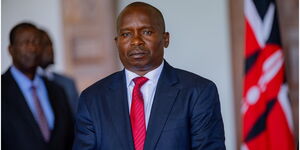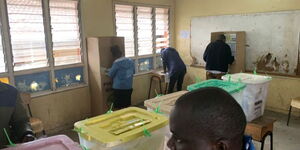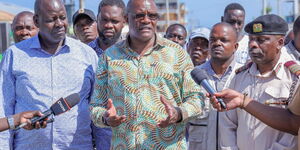The debate on postponing the 2022 General Election has taken a new twist, even as the country edges closer to the Tuesday, August, 9 polls.
Questions have been raised on the readiness of the Independent Electoral and Boundaries Commission (IEBC) to handle the much-anticipated election.
The poll agency Chairperson, Wafula Chebukati, is walking a tight rope as he navigates the commission's way out of a standoff with Members of Parliament. The Mps have threatened to decline the Ksh40 billion polls budget, amendments to the electoral laws as well as the request by the commission to procure new technologies to manage the elections.
IEBC’s quest for the new systems (servers) was quashed by the Public Procurement Administrative Review Board (PPARB), denting its preparations.
On Wednesday, August 11, the procurement board barred the commission from awarding a tender for the supply of the new Kenya Integrated Electoral Management System (Kiems), forcing Chebukati to go back to the drawing board to formulate a way out.
“Under Section 168 of the Public Procurement and Asset Disposal Act of 2015, the proceedings are hereby suspended and no contract shall be signed between the procurer and the tenderer awarded the contract unless the appeal has been finalised,” PPRAB ordered while rejecting IEBC's request.
PPARB based its decision on an appeal against the IEBC tender filed before the board even as a case by activist Okiyah Omtatah challenging the commission’s tender awarding process continues in court.
IEBC wanted the controversial servers developed in 2012 by French firm Idemia, previously known as OT-Morpho, replaced by the new Kiems. It argued that Kenya has over depended on the OT-Mopho servers since digital technology was inculcated into Kenya’s electoral process.
In the contested 2017 election, the 2012 serves were reported to have failed. This formed a key basis in the arguments presented at the Supreme Court leading to the nullification of the presidential elections.
The Supreme Court further directed IEBC to open the servers for contesting parties to ascertain the vote tallying process but the electoral agency declined.
To avoid a repeat of the 2013 and 2017 scenarios, the Chebukati-led commission floated an international tender asking prospective firms to develop a new system that would be used in the President Uhuru Kenyatta succession race.
The commission, in the April 2021 tender notice, demanded that the new system should be able to support every aspect of the 2022 General Election, from nomination to voter tallying. This includes voter and candidate registration, voter identification, results transmission and tallying.
A clamour to postpone the election, led by Central Organisation Trade Union (COTU, Secretary General Francis Atwoli, has attracted divided opinions from opposing political factions.
However, Atwoli's call for postponement of elections was not directly related to the IEBC preparedness but on the Building Bridges Initiative (BBI), currently awaiting a Court of Appeal ruling.
“If something happens and we do not win, we will move to the Supreme Court. If we cannot get it, then we will have to start the referendum process afresh. We will appeal to our parliamentarians to extend the election by a year," Atwoli, President Uhuru’s ally, declared.
Former nominated Senator Paul Njoroge also petitioned IEBC to push the 2022 election date, arguing that August 9, 2022, General Election should be moved to August 2023 to allow Uhuru to serve his full term.
“If elections were to be conducted on August 9, 2022, President Kenyatta would be denied over four months of his presidential term,” she argued.












